calsfoundation@cals.org
Hollywood (Clark County)
Hollywood (Clark County) is a small community located thirteen miles southwest of Arkadelphia (Clark County). Originally a farming village along the Terre Noire Creek, the area served as the county seat of Clark County until 1842. Notable Arkansans Albert Pike, Robert Crittenden, and Chester Ashley frequented the area to further their law practices. Today, the once vibrant town has dwindled to an unincorporated status and is heavily reliant on nearby Arkadelphia.
As early as 1811, people began settling along the Terre Noire Creek—also known as Wolf Creek—in the area that would become Hollywood; most of these early settlers were farmers searching for fertile soil in which to plant their crops. This small settlement quickly grew into a village along the Southwest Trail. A post office was established as the area grew. In 1820, the first Arkansas Militia was formed near Hollywood, and by the early 1830s, the area had become a prominent locale in Clark County. This area—then named Greenville—became the county seat of Clark County in 1830, a position it held until 1842 when the county seat moved to Arkadelphia. The post office was moved to Crittenden (Clark County) in 1843 by order of the postmaster. In 1850, another post office was established in the nearby community of Anvil (Clark County), and in 1860 this post office was moved and renamed Hollywood due to the abundance of holly trees in the area. The first school was built in 186l; it was a two-story building that was shared by the Masonic lodge.
Prior to the Civil War, a Mr. Witherspoon moved into the area and established a hotel. According to lore, the town was renamed Spoonville in his honor. While evidence does not support this tale, a post office with the name of Spoonville was established in the area on April 3, 1871. By 1876, the post office at Hollywood was closed, and mail was rerouted to the Spoonville office. A few months later, on January 22, 1877, the Spoonville post office name was changed to Hollywood. On February 9, 1880, the town was incorporated with a population of 103. Additionally, there were several churches and stores in the area. In 1884, the Davidson Methodist Campground was established three miles southwest of town; this camp still holds annual meetings. By 1890, several stores and businesses were established in the area, including Garrison’s General Store, Wingfield and Jackson General Store, and E. S. Lee Grocery Store. The town also had a small sawmill and cotton gin.
The 1900s saw a decline in business for Hollywood. In 1931, the Hollywood school—with the exception of the elementary school—was annexed by the Arkadelphia School District. The school had serviced the town since the 1860s. By 1950, all grades were consolidated into Arkadelphia. In 1954, there was only one store in the town—owned by Gerald Clark—but it was sold in 1975. That same year, the post office was discontinued. The town continued to falter, and by 1991 the one remaining store was closed. In 1994, Hollywood was listed as an unincorporated village. Today, the area has been consolidated into the city of Arkadelphia.
For additional information:
Ballew, Margie. “Interview with Margie Ballew.” June 7, 2008. Audio online at the CALS Butler Center Audio Video Collection. Margie Ballew Interview (accessed December 8, 2021).
Jennings, Oliver W. “Memories of Hollywood.” In Arkansas Souvenirs. East St. Louis, IL: The Call Printing Co., 1915. Library of Congress Americana Collection. https://archive.org/details/arkansassouvenir00jenn/page/n23 (accessed December 8, 2021).
May, Joe. The Way We Were: A Pictorial History of Clark County. Hurst, TX: Curtis Media, 1995.
Richter, Wendy, ed. Clark County Arkansas: Past and Present. Arkadelphia, AR: Clark County Historical Association, 1992.
Syler, Allen, et al., eds. Through the Eyes of Farrar Newberry: Clark County, Arkansas. Arkadelphia, AR: Clark County Historical Association, 2002.
Jacob Worthan
Henderson State University
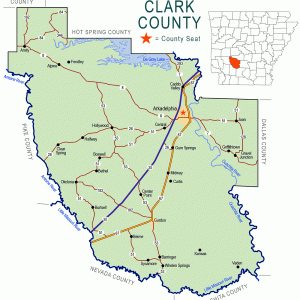 Clark County Map
Clark County Map 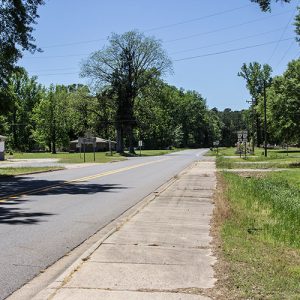 Hollywood
Hollywood 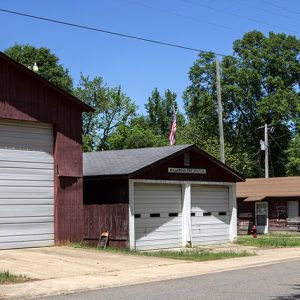 Hollywood Fire Dept.
Hollywood Fire Dept. 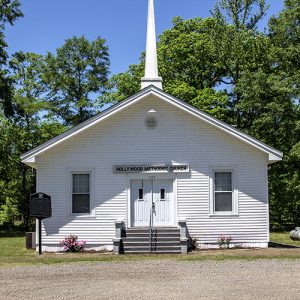 Hollywood Methodist Church
Hollywood Methodist Church 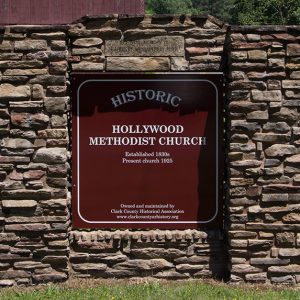 Hollywood Methodist Church Sign
Hollywood Methodist Church Sign 




Comments
No comments on this entry yet.